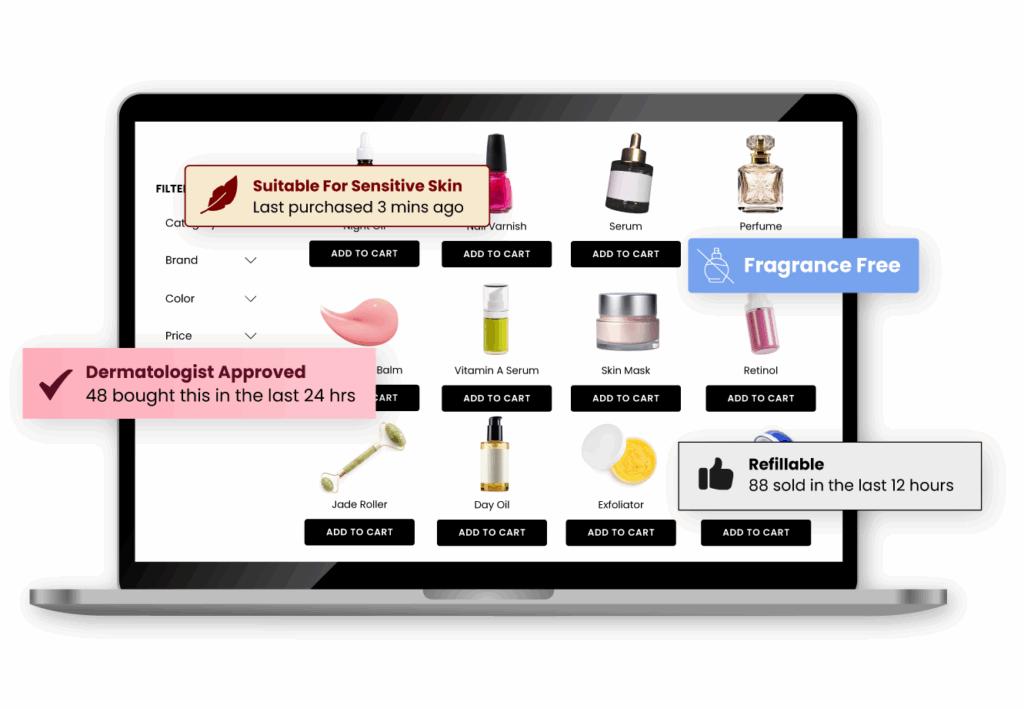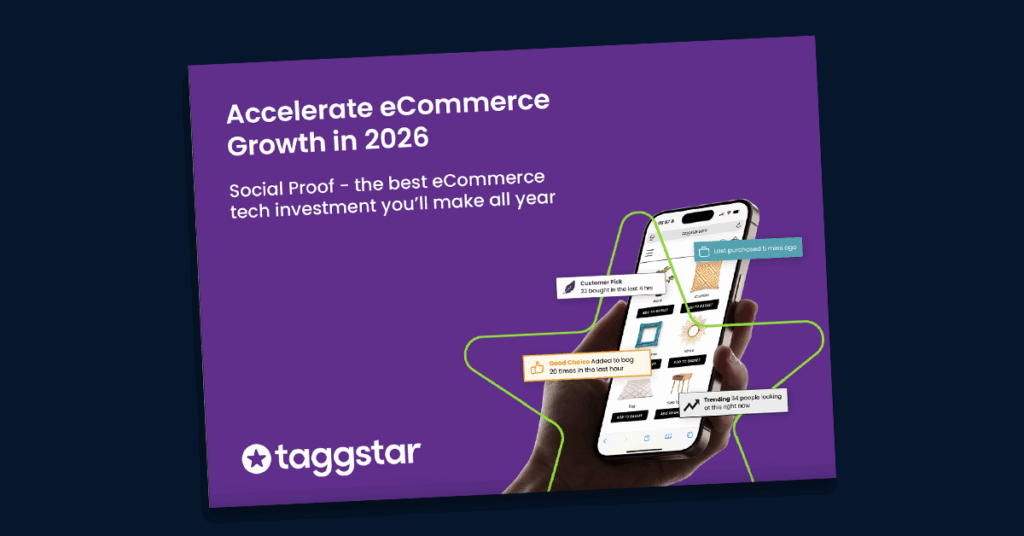Product attributes are the details that help consumers learn about a product to make informed and confident purchase decisions. Product attributes can include everything from size, color, and material to less visible features such as sustainability or intangible benefits such as suitability. In retail and eCommerce, product attributes play a critical role in helping shoppers find, understand, and choose products that meet their needs.
For eCommerce marketers and merchandisers, attributes are necessary to create effective product pages, enhance search and filtering, and increase conversions by highlighting key product information throughout the customer journey. For brands and retailers with large and fast-changing product catalogs, managing attributes can be resource-intensive and overwhelming.
Fortunately, there are technology platforms that help retailers improve the efficiency of product attribute management. Powered by AI, Taggstar’s Attribute Messaging helps automate how key product features are dynamically highlighted on-site to capture shopper attention, improve engagement, elevate discovery and ease the decision-making process.
What Are Product Attributes? Definition & Meaning
Product attributes are the details that describe a specific product, including features and characteristics like size, color, material, functionality, and more.
Product attributes can be both tangible and intangible. Both types of attributes are critical in retail and eCommerce as they allow brands and retailers to merchandise product assortments.
Tangible attributes are physical or measurable qualities. Examples include:
- Size
- Materials
- Color
- Specifications
- Fit
Intangible attributes are non-physical qualities. Examples include:
- Sustainability
- Suitability
- Popularity
- Benefits
- Ethical sourcing or Made locally
Product attributes provide shoppers with the details they need to make informed purchase decisions, including a complete understanding of the specifications of a product, the benefits, how it works and if it meets their needs.
Why Product Attributes Matter in eCommerce
Used in product listings, product detail pages, filters, recommendations and search, product attributes are key to a successful eCommerce experience. When product attributes are clearly defined, they improve product discoverability, relevancy and shopper confidence.
Accurate product attributes determine how items are identified and displayed through site search, navigation and filters. For example, if a shopper searches for an “eco-friendly organic white shirt”, the relevancy of the results will depend on the accuracy of attributes for that product.
Shoppers today expect to be able to filter choices and compare based on attributes such as color, fit, brand, specific features and more. Without the right product attributes, it is impossible to accurately help shoppers narrow choice, which can be frustrating and lead to higher bounce rates.
Product attributes also help reduce uncertainty by providing hesitant shoppers with information that gives them the confidence to buy. Knowing that a shirt is machine-washable and a best-seller builds trust and encourages purchase, which directly impacts conversion rate optimization.
Retailers and brands can elevate product discovery and improve conversions by implementing Attribute Messaging. By surfacing relevant attributes upfront, it is possible to capture and keep the attention of shoppers when they first land on a product page.
When executed right, product attributes can have a significant impact on user experience and conversion; however, poorly defined or inconsistent product attributes, such as missing sizing details or limited specifications, can damage customer confidence, increase returns, and hurt SEO.
Different Types of Product Attributes (With Examples)
There are basically two different types of product attributes: tangible and intangible attributes. Tangible product attributes are physical and measurable features that customers can see or experience.
Intangible product attributes are product qualities that cannot be measured or seen, but still influence consumer perception about a product.
| TANGIBLE ATTRIBUTES | EXAMPLES |
| Size | Small, Medium, Large, 38 |
| Color | Black, Olive Green, Navy Blue, Rose Gold |
| Materials | 100% Cotton, Leather, Recycled Polyester |
| Dimensions | 30in x 40in, 5in Wide |
| Weight | 5lbs, Lightweight |
| Fit | True to Size, Slim Fit, Oversized |
| Quantity | Pack of 3, 45 FL OZ bottle |
| Technical Specs | 256GB storage, 4K resolution |
| INTANGIBLE ATTRIBUTES | EXAMPLES |
| Sustainability | Made from recycled materials |
| Ethical Sourcing | Fair Trade, Locally Made |
| Suitability | Ideal for sensitive skin, Perfect for travel |
| Performance | Water-proof, Long-lasting battery |
| Brand Story | Family-owned, Heritage brand |
| Customer Feedback | 4.8 stars |
| Certifications | Organic Certified, FDA Approved |
How to Use Product Attributes in eCommerce
Leveraging product attributes in eCommerce and marketing is critical to improve the overall shopping experience and both in-store and online sales.
- Product Discovery & Filtering
If a shopper searches for a “recycled yellow rainproof jacket under $100”, he or she expects to find results that relate to those search terms.
Accurately tagged attributes like color, material, price and sustainability allow search engines and filters to find and present the most relevant products. In return, the shopper finds exactly what he/she wants, reducing bounce rates and improving conversions. - Personalization
By leveraging tagged attributes tied to user behavior, retailers and brands can automatically identify and surface products that are relevant to a specific customer, such as sustainability, suitability, origin and more.
- Attribute Messaging
By highlighting relevant product attributes, retailers can capture the attention of shoppers the moment they land on an eCommerce site. Pulled dynamically from product data, Attribute Messaging helps shoppers make more informed purchase decisions, resulting in more confident purchases, lower cart abandonment, and increased conversions.
- Bundling & Cross-Selling
Retailers and brands often offer bundles and cross-sells to increase order value. Product attributes are key when creating relevant bundle offers. For example, when shopping for a laptop, attributes like device compatibility and brand are necessary to create relevant bundle offers with compatible accessories.

Common Challenges with Product Attributes
Many retailers and brands struggle with implementing product attributes effectively due to challenges like inconsistent manufacturer information, data overload, and siloed systems. Attributes are often entered manually across teams or suppliers, leading to duplication, missing fields, or varied naming conventions.
As product catalogs grow, managing thousands of attributes becomes overwhelming, especially without clear workflows or ownership.
Additionally, when product data is stored in disconnected systems such as spreadsheets or outdated CMS tools, it is nearly impossible to keep attributes current, accurate and consistent across all channels.
Attribute Messaging: The Next Step in Optimizing eCommerce Product Pages
As more and more shoppers land directly on product pages from search engines and social media, the PDP has essentially become the front door to eCommerce. You only have moments to capture the attention of shoppers and keep them engaged. In fact, a recent study revealed that 47% of visitors bounce if they don’t immediately see key information on a retailer’s site, and 40% only view the top half of the page.
Powered by AI, Taggstar’s Attribute Messaging is designed to highlight essential product attributes directly within the shopping experience, above the fold, to capture attention fast, and help shoppers make more informed purchase decisions. Attribute Messaging allows retailers and brands to showcase key product features, including material, fit, sustainability and product benefits in clear and visually engaging messages throughout the eCommerce experience.
The product catalog merchandiser chat feature helps you automatically surface new attribute suggestions based on real shopper trends, even if the attributes are not already included in a retailer’s product data set.
Benefits of Attribute Messaging
- Enhanced Product Discovery by surfacing critical product information upfront
- Improved Decision-Making by providing clear attribute information, reducing uncertainty, and helping customers make more confident decisions
- Improved User Experience by streamlining access to important product details, retailers can minimise the need for extensive browsing, leading to a more efficient shopping journey
By combining Attribute Messaging with Social Proof Messaging, the outcome is even more powerful. The relevancy of product attributes and the power of social proof immediately draws shopper attention, improves trust and increases conversions.
Unlock the Power of Product Attributes with Taggstar
Well-tagged product attributes enhance discoverability and power the dynamic, personalised experiences that shoppers today expect. Retailers and brands should prioritise clear, consistent, and enriched product attributes to deliver the best customer experience possible, improve marketing ROI and increase conversions and revenue.
With the right tools and platforms, retailers can scale, optimize and increase conversions more efficiently and effectively. Solutions such as Attribute Messaging dynamically leverage product attributes to deliver engaging experiences that capture the attention of shoppers, reduces bounce rates and increases conversions.
Learn how you can unlock the power of Taggstar’s Attribute Messaging




